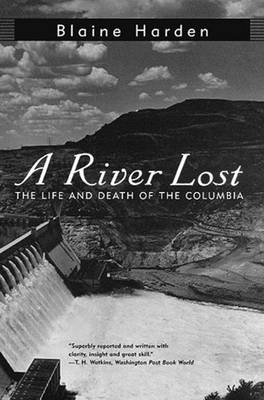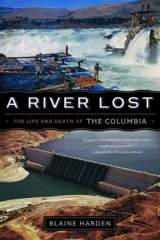
A River Lost
The Life and Death of the Columbia
Seiten
1998
WW Norton & Co (Verlag)
978-0-393-31690-2 (ISBN)
WW Norton & Co (Verlag)
978-0-393-31690-2 (ISBN)
- Titel erscheint in neuer Auflage
- Artikel merken
Zu diesem Artikel existiert eine Nachauflage
"A River Lost is superbly reported and written with clarity, insight, and great skill."—Washington Post Book World
After a two-decade absence, Washington Post journalist Blaine Harden returned to his small-town birthplace in the Pacific Northwest to follow the rise and fall of the West's most thoroughly conquered river.
Harden's hometown, Moses Lake, Washington, could not have existed without massive irrigation schemes. His father, a Depression migrant trained as a welder, helped build dams and later worked at the secret Hanford plutonium plant. Now he and his neighbors, once considered patriots, stand accused of killing the river.
As Blaine Harden traveled the Columbia-by barge, car, and sometimes on foot-his past seemed both foreign and familiar. A personal narrative of rediscovery joined a narrative of exploitation: of Native Americans, of endangered salmon, of nuclear waste, and of a once-wild river now tamed to puddled remains.
Part history, part memoir, part lament, "this is a brave and precise book," according to the New York Times Book Review. "It must not have been easy for Blaine Harden to find himself turning his journalistic weapons against his own heritage, but he has done the conscience of his homeland a great service."
After a two-decade absence, Washington Post journalist Blaine Harden returned to his small-town birthplace in the Pacific Northwest to follow the rise and fall of the West's most thoroughly conquered river.
Harden's hometown, Moses Lake, Washington, could not have existed without massive irrigation schemes. His father, a Depression migrant trained as a welder, helped build dams and later worked at the secret Hanford plutonium plant. Now he and his neighbors, once considered patriots, stand accused of killing the river.
As Blaine Harden traveled the Columbia-by barge, car, and sometimes on foot-his past seemed both foreign and familiar. A personal narrative of rediscovery joined a narrative of exploitation: of Native Americans, of endangered salmon, of nuclear waste, and of a once-wild river now tamed to puddled remains.
Part history, part memoir, part lament, "this is a brave and precise book," according to the New York Times Book Review. "It must not have been easy for Blaine Harden to find himself turning his journalistic weapons against his own heritage, but he has done the conscience of his homeland a great service."
Blaine Harden, an award-winning journalist, is a contributor to The Economist and a former foreign correspondent for the Washington Post. He lives in Seattle, Washington.
| Erscheint lt. Verlag | 4.3.1998 |
|---|---|
| Verlagsort | New York |
| Sprache | englisch |
| Maße | 140 x 211 mm |
| Gewicht | 275 g |
| Themenwelt | Geschichte ► Teilgebiete der Geschichte ► Kulturgeschichte |
| Naturwissenschaften ► Biologie ► Ökologie / Naturschutz | |
| ISBN-10 | 0-393-31690-4 / 0393316904 |
| ISBN-13 | 978-0-393-31690-2 / 9780393316902 |
| Zustand | Neuware |
| Haben Sie eine Frage zum Produkt? |
Mehr entdecken
aus dem Bereich
aus dem Bereich
der stille Abschied vom bäuerlichen Leben in Deutschland
Buch | Hardcover (2023)
C.H.Beck (Verlag)
23,00 €
Die Revolution des Gemeinen Mannes
Buch | Softcover (2024)
C.H.Beck (Verlag)
12,00 €



